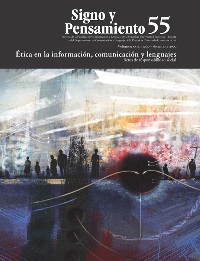Abstract
This article approaches the problem of Paul Ricoeur’s personal identity’s ethical dimension. This personal identity’s ethical dimension is presented in three parts. First, we define what does the subject’s personal identity mean, based on the subject’s understanding of his/her-self. Second, we point out how this identity is expressed through narrative. Finally, we show how the aforementioned ethos is narratively understood, thus inspiring the worlds of culture, history, literature, and politics.
Gadamer, H.-G. (1994), La actualidad de lo bello, Barcelona, Paidós.
Greisch, J. (1993), “Éthique et ontologie”, en Levinas, E., L’éthique comme philosophie premiere, Paris, Éditions du Cerf.
— (1985), L’age herméneutique de la raison, Paris, Éditions du Cerf.
Grondin, J. (1990), “L’herméneutique positive de Paul Ricœur”, en Temps et récit de Paul Ricœur en débate, Paris, Éditions du Cerf.
Heidegger, M. (1966), Questions iii-iv, Paris, Gallimard. [Traducción al castellano de Rafael Gutiérrez Girardot, Taurus, Madrid, 1959].
— (1983), “Retorno a la patria”, en Interpretaciones sobre la poesía de Hölderlin, Barcelona, Ariel.
— (1996), Heraklit, Frankfurt, Vittorío Klostermann.
Heráclito (1972), Fragmentos, Madrid, Tiempo Nuevo.
Kemp, P. (1993), “Il timore per altri”, en Segni e Comprensione, vol. viii, núm. 18 , pp. 19-23.
Levinas, E. (1977), Totalidad e infinito: ensayo sobre la exterioridad, Salamanca, Sígueme.
McIntyre, A. (1987), After Virtue. A Study in Moral Theory, London, Ducworth.
Ricœur, P. (1955), Histoire et vérité, Paris, Seuil.
— (1965), De l’interprétation. Essai sur Freud, Paris, Seuil.
— (1968), Le conflit des interprétations, Paris, Seuil.
— (1969), Le conflit des interprétations, essai d’herméneutique, Paris, Seuil.
— (1975), La metaphore vive, Paris, Seuil.
— (1983, 1984a y 1985a), Temps et récit I, II. III, Paris, Seuil.
— (1984b), “Le temps raconté”, en Revue de Métaphysique et de Morale, vol. 89, núm. 44, pp. 436-452.
— (1985b), “Ontologie”, en Enciclopaedia universalis, Paris, Éditeur a Paris.
— (1986a), “Ipséite, altérite, socialité”, en Revue Archive de Philosophie, LIV, N° 1–3.
— (1986b), Du texte a l´action. Essais d’herméneutique, i, Paris, Seuil.
— (1987), A l’école de la phénomenologie, Paris, Libraire Philosophique.
— (1988a), Finitude et culpabilité, Saint-Amand, Aubier: Philosophie de l’esprit.
— (1988b), Le volontaire et l’involontaire, SaintAmand, Aubier: Philosophie de l’esprit.
— (1990), Soi-même comme un autre, Paris, Seuil. [Trad. al castellano: Sí mismo como otro, México, Siglo XXI, 1996.
— (1991a), “Post-face au temps de la responsabilité”, en Lectures 1. Autour du politique, Paris, Seuil, pp. 270-293.
— (1991b), Lectures 1. Autour du politique, Paris, Seuil.
— (1992), Lectures 2. La contrée des philosophes, Paris, Seuil.
— (1994), Lectures 3. Aux frontières de la philosophie. Paris, Seuil.
— (2004), Memoria, la historia y el olvido, Barcelona, Trotta.
— (2005), Los caminos del reconocimiento, Barcelona, Trotta.
Ricœur, P.; Halperin, J. et al. (1994), Éthique et responsabilité: Paul Ricœur, Paris, Éditions de la Baconniere, Boudry-Neuchatel.
Riedel, M. (1988), Für eine zweite Philosophie. Vortriige und Abhandlungen, Frankfurt, Suhrkamp.
Roman, J. (1990), “Libraire: Paul Ricœur, Soi– même comme un autre”, en Revue Esprit, núm. 5, pp. 155-157.
Rossi, O. (1980), “Per un’analisi dell’ontologia di Paul Ricœur”, en Aquinas, núms. 2-3, pp. 439-466.
Soëtje, E. (1993), Ricœur. Tra narrazione e storia, Torino, Rosenberg & Sellier.
Vattimo, G. (1975), Etica dell’interpretazione, Torino, Rosenberg & Sellier.
— (1994), “Reconstrucción de racionalidad”, en Hermenéutica y racionalidad, Bogotá, Norma, pp. 141-161.
Zapata, G. (1994), Etica de la razón hermenéutica, Roma, Editrice Pontificia Università Gregoriana.
This journal is registered under a Creative Commons Attribution 4.0 International Public License. Thus, this work may be reproduced, distributed, and publicly shared in digital format, as long as the names of the authors and Pontificia Universidad Javeriana are acknowledged. Others are allowed to quote, adapt, transform, auto-archive, republish, and create based on this material, for any purpose (even commercial ones), provided the authorship is duly acknowledged, a link to the original work is provided, and it is specified if changes have been made. Pontificia Universidad Javeriana does not hold the rights of published works and the authors are solely responsible for the contents of their works; they keep the moral, intellectual, privacy, and publicity rights.
Approving the intervention of the work (review, copy-editing, translation, layout) and the following outreach, are granted through an use license and not through an assignment of rights. This means the journal and Pontificia Universidad Javeriana cannot be held responsible for any ethical malpractice by the authors. As a consequence of the protection granted by the use license, the journal is not required to publish recantations or modify information already published, unless the errata stems from the editorial management process. Publishing contents in this journal does not generate royalties for contributors.


